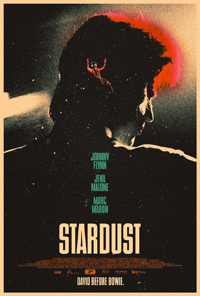Stars Are Blind: Range Paints a Portrait of the Bowie as a Young Man
 The risk with creating a project about a major cultural icon without authorization from said artist’s estate is failing to convey an impression of its subject, ultimately vulnerable to ire or criticism for its aims. The silver lining in being denied carte blanche access to plunder someone’s artifacts to pursue the format of a biopic is being forced into concocting something more eccentric and original, which seems a perfect approach to the subject of David Bowie.
The risk with creating a project about a major cultural icon without authorization from said artist’s estate is failing to convey an impression of its subject, ultimately vulnerable to ire or criticism for its aims. The silver lining in being denied carte blanche access to plunder someone’s artifacts to pursue the format of a biopic is being forced into concocting something more eccentric and original, which seems a perfect approach to the subject of David Bowie.
For Stardust, director Gabriel Range takes pointed aim at an important transitional period for the musician in 1971, where an ill-fated US tour of his third album would lead to the creation of his iconic and influential stage persona Ziggy Stardust. Despite a watchable lead performance from Johnny Flynn, those wholly ignorant of Bowie may not have the patience to suss through Range and writer Christopher Bell’s subtle details of the artist during this period and shouldn’t be the starting point for anyone looking for an introduction into either the artist or his accomplishments.
After his track “Space Oddity” put him on the map as solo artist in 1969 from his second album, David Bowie (Johnny Flynn)’s third album The Man Who Sold the World revealed itself to be a difficult project for marketing. With its first single flopping in the US, his UK label finagled an ill-fated US tour with Mercury Records, though failing to supply him with a work visa would severely hobble his chances at success. Assigned to publicist Ron Oberman (Marc Maron), who believed in Bowie’s talent, the two men set off on a grueling task to get Bowie in front of a gaggle of jaded journalists with the hopes of landing the cover of Rolling Stone. But the personal demons which influenced the album seem to plague the musician’s articulation of his persona or his message. Throughout the limited tour, Oberman’s introduction to certain artistic influences would lead to Bowie’s creation of Ziggy Stardust, eventually leading to the iconic 1972 album The Rise and Fall of Ziggy Stardust and the Spiders from Mars.
A happy medium exists somewhere between the somewhat peripheral feeling of Stardust and the glossy extravaganzas such as Bohemian Rhapsody (2018) and Rocketman (2019), which take formidable liberties in diminishing the queerness of subjects like Freddie Mercury or Elton John for nostalgic mainstream indulgence.
The significance of Bowie’s androgyny and the resulting vitriol doesn’t feel quite full-fledged, despite bitchy, self-important journalists writing him off as a “fey, self-indulgent dandy,” or one such infamous quip about his resemblance to Lauren Bacall on his album cover. As Ron Oberman, Marc Maron tries valiantly to maintain an air of sacrifice for his belief in artistic integrity, but it feels as if Range depends a bit too much upon this characterization as Bowie’s omnipresent cheerleader, while the relationship between the men is never presented as being close or intimate. As wife Angie Bowie, the curiously cast Jena Malone is backed into a shrill corner.
The selling point is a willowy Flynn (Beast, 2017) as the troubled, somewhat lethargically inclined Bowie, a young man so frustratingly cerebral he seems unable to articulate his desires for himself as an artist—and, as we’re hit over the head with, it relates to the influence of this particular album exploring familial mental illness he can perhaps only approach through creative metaphor.
Skipping ahead to 1972, we get the tiniest glimpse of glam rock Ziggy, like many a portrait or biopic choosing narrative convenience over fact (to be fair, the intro to the film cheekily introduces this as ‘mostly’ fiction) it skips over a whole album between the two artistic points, 1971’s Hunky Dory. Minor peripheral moments, such as on offscreen visit to Andy Warhol (who Bowie would later play in 1996’s Basquiat) is as disappointing for the artist as it is for the film’s audience. Although Range and Bell make sure to mention many of the influences which would inspire Ziggy (Iggy Pop, the Legendary Stardust Cowboy), they never quite manage to showcase the fledgling talent Bowie already had.
★★/☆☆☆☆☆


